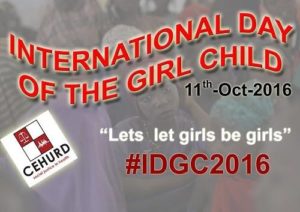 Today marks the International Day of the Girl Child, The theme this year is “Girls’ Progress = Goals’ Progress: A Global Girl Data Movement”, calling for action on increasing the availability and analysis of girl-focused and sex-dis aggregated data.
Today marks the International Day of the Girl Child, The theme this year is “Girls’ Progress = Goals’ Progress: A Global Girl Data Movement”, calling for action on increasing the availability and analysis of girl-focused and sex-dis aggregated data.
In line with health and human rights, the girl child has been expose to societal evils such like defilement, rape , discrimination and inequality in society.
According to the Uganda Bureau of Statistics in Uganda, one in every four teenage girls between 15 and 19 was found pregnant. The Population Secretariat indicates that of the 1.2 million pregnancies recorded in Uganda annually, 25 per cent of these are teenage pregnancies. These more than 300,000 teenagers who get pregnant also account for the bulk of unwanted pregnancies, which end up in unintended births or abortion.
A young girl is twice likely to die during pregnancy or child birth compared to a mature lady in her 20s (UNFPA 2013).
A significant number of young people lack information about pregnancy or access to reproductive health services, and rely on myths and misconceptions. Continued information sharing is needed to provide information that can enable them make informed choices for “Girl progress and Goal Progress”.
The Center for Health Human Rights and Development (CEHURD) has held health talks for the youths in school to support information sharing on reproductive health for good health and well being under the Sustainable Development Goal 3.

